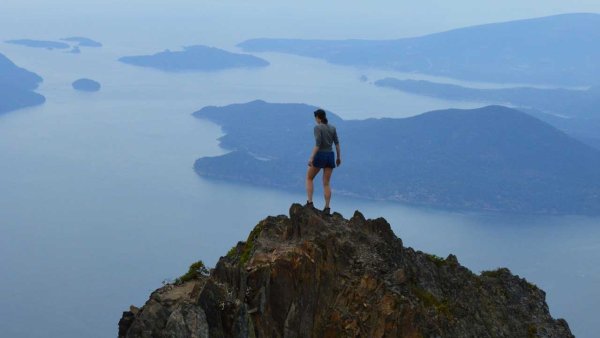Guest Post: Ellika Cairns, Sea to Sky Invasive Species Council

In the Sea to Sky, we’re fortunate to have an abundance of trails and roads that allow us to access lush forests, glacial blue lakes, towering granite cliffs, and awe-inspiring alpine terrain. These places boast diverse, and often sensitive, ecosystems.
Invasive species are non-native plants and animals that threaten these areas. They tend to grow rapidly and form monocultures, which out-compete native species and disrupt the natural processes of our ecosystems. Invasive species can also be toxic to humans and animals, and may have significant economic impacts if they become established.

Several invasive species are quite abundant in urban areas / low elevations in the Sea to Sky, such as Common Burdock or Orange Hawkweed, and we want to prevent them from spreading even further. When venturing out in the backcountry, you could accidentally be carrying along undesirable hitchhikers in your tires, shoes, backpack, and other gear.
Don’t let invasive species hitch a free ride – here’s how you can prevent the spread:
1. Come clean, leave clean. Remove plants and mud from shoes, clothes, gear, & pets.
Seeds or other plant parts could easily be hiding in dirt. Some plants also have special
adaptations that make it easy for them to stick onto fur or clothing and travel long distances, for
example the burrs from Common Burdock.
2. Stay on designated roads and trails. Not only does this help protect native plants, it also reduces the chance of you driving or walking over an invasive plant, and spreading it further.
3. Don't move firewood. Buy local, burn local. Firewood could be carrying invasive pests and diseases, which may severely damage local trees if they become established here. Buy local and certified heat-treated firewood (ideally within 80km of your destination).
4. Clean, drain, and dry your watercraft. Aquatic invasive species could be hiding on your boat, paddle board, or floatie. Make sure your gear gets a good rinse and a chance to dry off between uses.
Report any invasive species you come across.
5. Report invasive species. The Sea to Sky Invasive Species Council needs your help to spot invasive species, especially out in remote areas. If you think you’ve spotted an invasive plant or animal: take a picture, note down the location, and make a report online.
Let’s do our part to protect BC’s beautiful trails, campgrounds, lakes, and recreational sites from invasive species. Learn more about invasive species from the Sea to Sky Invasive Species Council.

Essential Resources
General
- BC AdventureSmart
- BC Parks - Homepage
- CWSAA - Alpine Responsibility Code
- BC Parks - Responsible Recreation
- Hello BC - How to Travel Safely & Responsibly
- Indigenous Tourism BC - How to Travel Responsibly
- Leave No Trace
- Outdoor Recreation Council of BC - Recreate Responsibly
- Recycle BC - Pack Lean Leave Clean
- RecycleBC - Pack Lean Leave Clean - Toolkit
- Wilderness Tourism BC - ExploreWildBC Pledge
- BC Parks - KBYG Toilet Edition
- BCSARA - Outdoor Education
- Invasive Species Council of BC - Play Your Part
- Tourism Squamish - Responsible Recreation
- Tourism Whistler - Responsible Travel
- Vancouver North Shore - Know Before You Go
- Fire & Ice Aspiring Geopark
- Átl'ka7tsem/Howe Sound Biosphere
- Adventure Hub - BC Search & Rescue Association
- AdventureSmart Trip Planning App
Camping
- Camper's Code
- WildSafeBC - Bare Campsite Program
- Outdoor Recreation Council of BC - Recreate Responsibly
- BC Parks - Stay Safe in Bear Country
- BC Parks - Campfire Bans & Safety
- BC Parks - Backcountry Visitor Guide
- BC Gov - Know the Rules for Rec Sites & Trails
- BCSARA - Outdoor Education
- Invasive Species Council of BC - Campers
- AdventureSmart Trip Planning App
Fishing
Hiking
- BC AdventureSmart
- CWSAA - Alpine Responsibility Code
- Outdoor Recreation Council of BC - Recreate Responsibly
- BC Parks - Backcountry Visitor Guide
- BC Gov - Know the Rules for Rec Sites & Trails
- BCSARA - Outdoor Education
- Invasive Species Council of BC - Play Clean for Hikers
- AdventureSmart Trip Planning App
Related Impacts

1 Garbage And Human Waste
The improper disposal of human waste and garbage is harmful to humans, the environment, and wildlife.
- Face masks collected by Vancouver plogger David Papineau
- 40,000
- Kilogams of trash removed by Divers for Cleaner Lakes and Oceans
- 23,500

4 Lack of Respect - People & Environment
From trampling on trails to human-caused wildfires, disrespectful behaviour is creating conflict between user groups and damage to the environment and communities.
- Percentage of human-caused wildfires in BC
- 42%